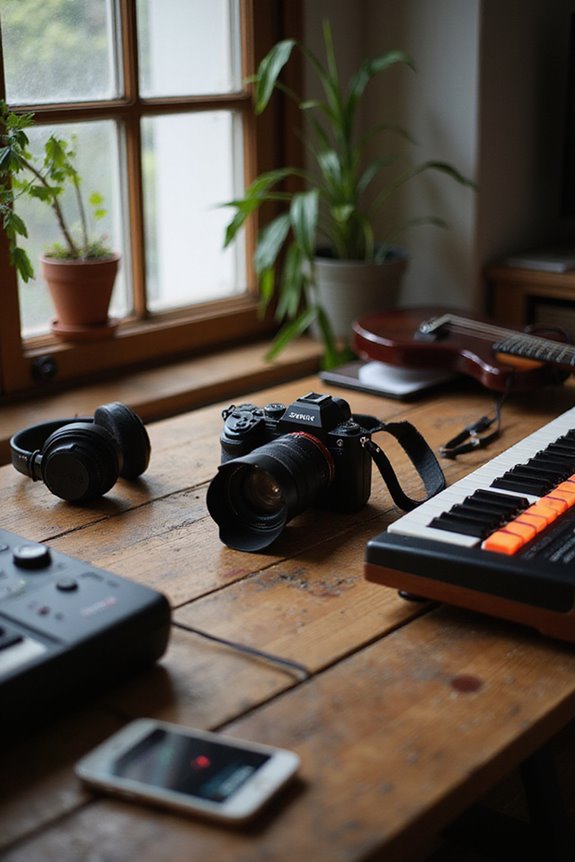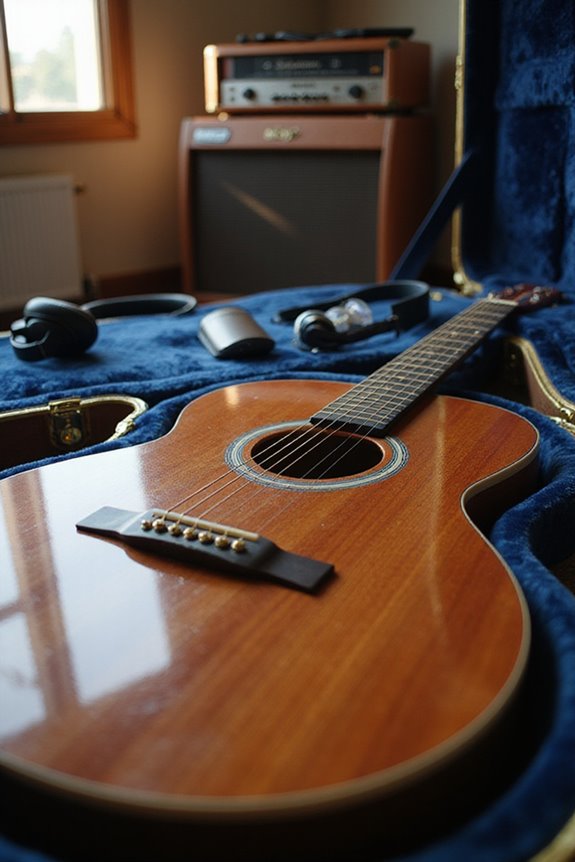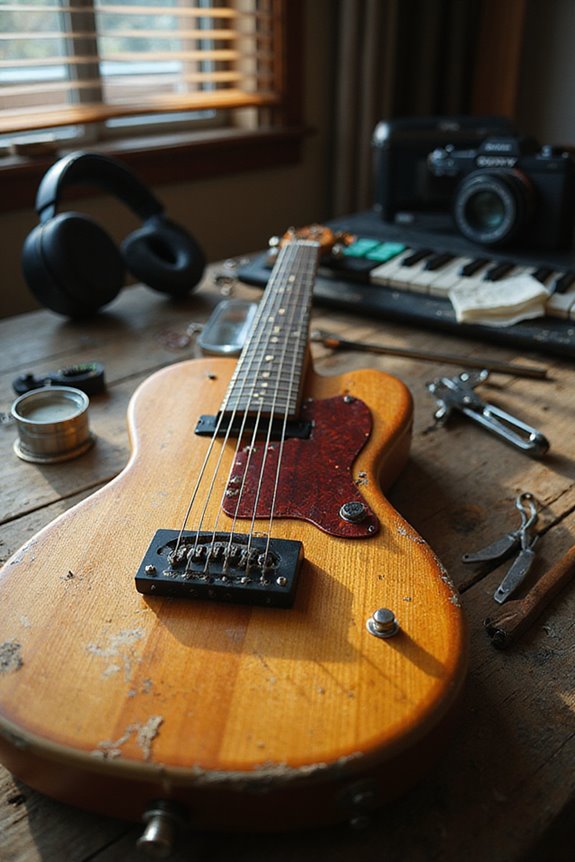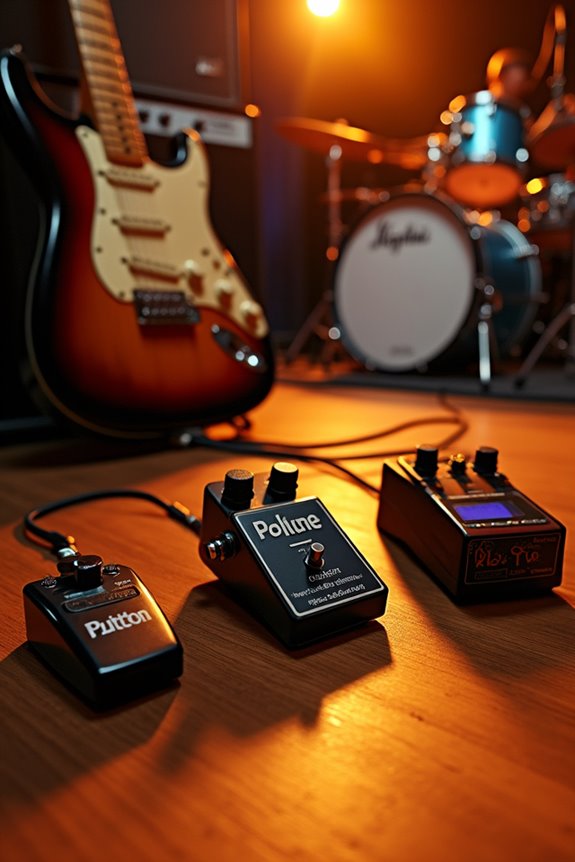When choosing guitar polish and cleaner, we should consider the finish type, such as nitrocellulose or polyurethane, to guarantee compatibility. For example, MusicNomad’s MN103 provides an all-in-one cleaning and polishing solution. Application techniques matter, too; we recommend using soft microfiber cloths in circular motions. Regular maintenance, like wiping down your guitar after each session, keeps it looking great and preserves its value. Let’s explore more tips to enhance your guitar care further.
Key Takeaways
- Match the polish with your guitar’s finish to ensure compatibility and avoid damage, especially with oil-based polishes on older instruments.
- Regular inspections help identify issues early, ensuring the longevity and integrity of your guitar.
- Choose mild formulas like Smith’s Pro Formula for versatility across different finishes without harsh effects.
- Employ soft microfiber cloths and gentle circular motions for application to prevent scratches and ensure even coverage.
- Consider all-in-one solutions like MusicNomad MN103 for efficient cleaning, polishing, and finishing in one product.
Understanding Different Types of Guitar Polishes
When we think about maintaining our guitars, one essential aspect that often gets overlooked is the type of polish we should use. Different polish types can greatly impact our instrument’s appearance and tonal qualities. For example, a French polish offers a delicate, glossy finish that enhances vibration and resonance, making it ideal for classical guitars. Nitrocellulose lacquer, on the other hand, provides a traditional look while preserving natural resonance, though it may require more meticulous care. Polyurethane paints are known for their durability and resistance to wear, making them great for players who frequently gig. Using the right cleaner benefits not just our guitar’s aesthetics but also its long-term health, allowing us to play confidently for years. Additionally, many products, such as MusicNomad MN103 Cleaner, are designed to provide both cleaning and protection, ensuring your instrument remains in pristine condition.
Key Considerations for Selecting a Guitar Polish
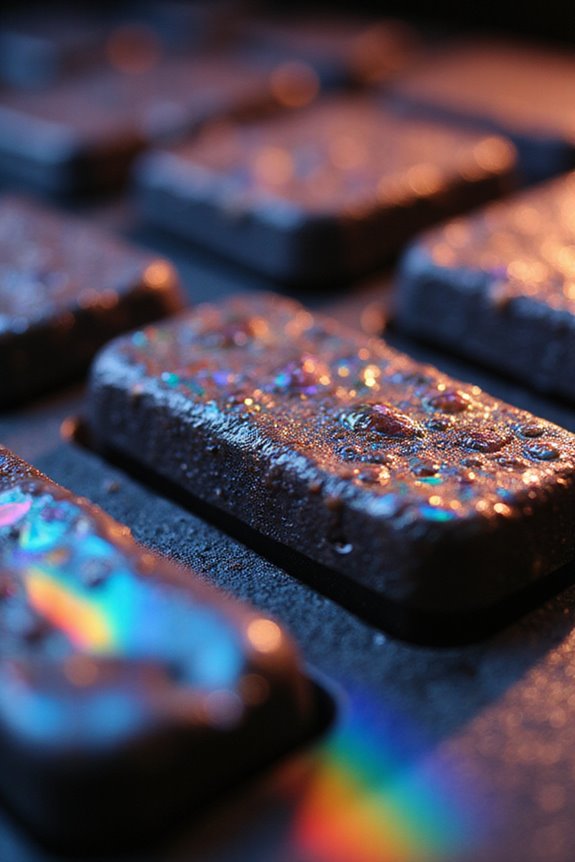
How can we choose the right polish for our guitars while ensuring we protect their beautiful finishes? First, we need to evaluate polish compatibility with our guitar’s finish. For example, oil-based polishes are ideal for oil finishes but risky on older instruments with cracked surfaces. We should also pay attention to application frequency; over-polishing can degrade the finish. Using mild formulas like Smith’s Pro Formula works well across various finishes. Remember to apply sparingly and with a soft cloth, avoiding vigorous rubbing. For satin finishes, gentler techniques help preserve texture. By choosing products endorsed by reputable makers, we enhance our guitar’s appearance and durability while safeguarding its tone and resonance. Additionally, regular inspections can help identify potential problems early in order to maintain the instrument’s integrity. Let’s keep our instruments looking great without compromising quality!
Popular Guitar Polish Brands and Their Features
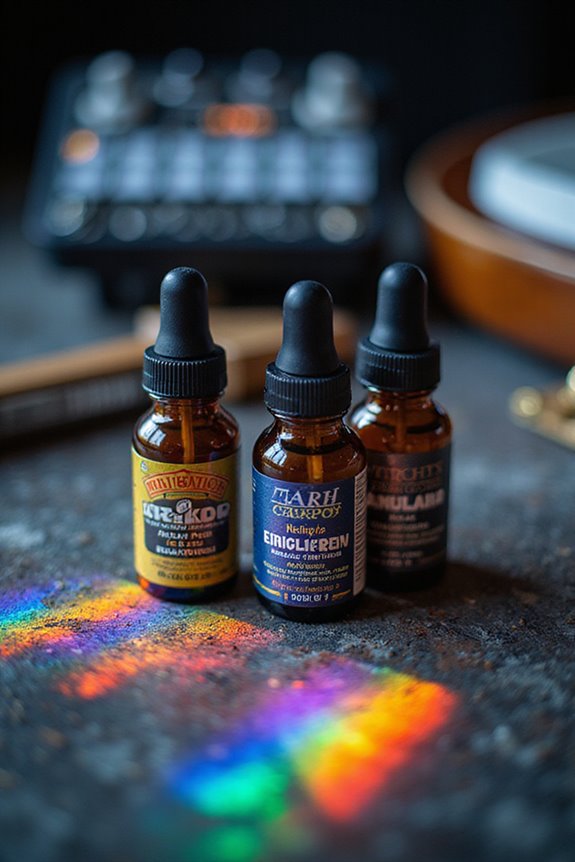
With a variety of guitar polish brands available, we can effectively enhance and maintain our instruments’ beauty while ensuring their protection. MusicNomad’s all-in-one MN103 excels in product effectiveness, combining cleaning, polishing, and finishing. In brand comparisons, Lizard Spit stands out with its dedicated formula, focusing purely on polish, which musicians often praise. Player’s Kit by Eternashine offers extensive solutions for detailed polishing and effective scratch removal. For delicate finishes, Novus products are gentle and non-abrasive. Meanwhile, Virtuoso is a popular choice among professionals for its ability to deliver high gloss and quick results. By exploring these options, we can confidently select the right polish tailored to our guitar’s needs.
Ingredients and Technology in Guitar Polishes
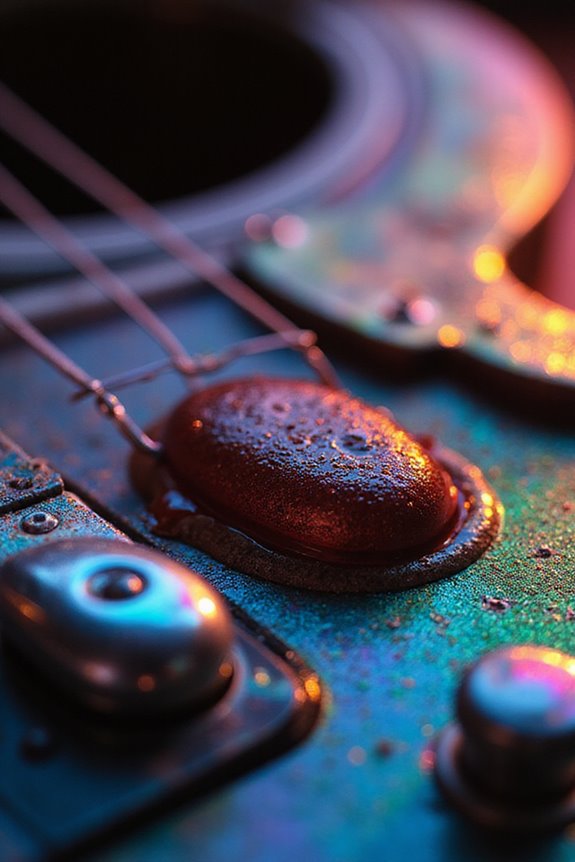
Guitar polishes are not just about shine; they’re formulated with a variety of ingredients that serve specific purposes for different finishes. For instance, isopropyl alcohol acts as a gentle cleaner without residue, while terpenes offer a pleasant fragrance. Each polish formulation can lead to different ingredient interactions, especially when considering sensitive nitrocellulose finishes.
Water-based emulsions are increasingly popular as they provide effective cleaning without harsh chemicals, preventing buildup. On the other hand, solvent-based formulas, while powerful against grime, require careful handling due to their volatile components. As we navigate through various options, opting for non-toxic and biodegradable polishes can enhance our instrument’s longevity while promoting environmental safety.
Effective Application Techniques for Guitar Polish
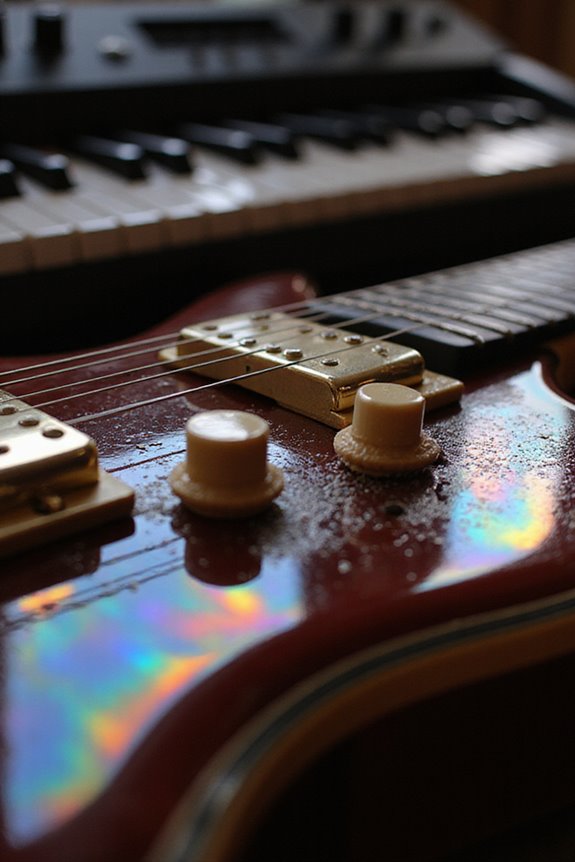
To achieve a flawless finish on our instruments, it’s essential that we employ effective application techniques when using guitar polish. First, let’s prioritize surface preparation. We start with a clean guitar, guaranteeing no dust or oils are present. Using microfiber or soft cloths prevents scratches during application.
When applying polish, we should use circular motions, which help reduce streaks and guarantee even coverage. Small amounts go a long way, so let’s avoid clogging the pads. Remember to keep polishing pads free of grit, and monitor our progress under good lighting.
Lastly, after applying polish, we can buff with a clean microfiber cloth to enhance the shine and reveal the results of our meticulous polishing techniques.
Safety Tips When Using Guitar Cleaners
When choosing cleaning products for our instruments, it’s essential we prioritize safety to protect both the guitar’s finish and our health. First, let’s use guitar-specific cleaners only; these are designed for finished wood surfaces and avoid harsh chemicals like ammonia or bleach. We should apply cleaners to a microfiber cloth instead of directly to the guitar, preventing accidental damage to electronics. When using lemon oil, remember it’s suitable only for fingerboards due to its acidic nature. Finally, we’ll guarantee adequate ventilation when cleaning and dispose of used cloths properly. By following these safety tips and effective cleaning techniques, we can maintain our guitars while keeping both our instruments and ourselves secure.
Benefits of Regular Guitar Maintenance
Regular maintenance is essential if we want our guitars to perform at their best and stand the test of time. By keeping a consistent maintenance frequency, we can enhance playability and sound quality. Regular string care helps eliminate dirt and sweat, ensuring smooth playing while preserving tonal clarity. Additionally, a well-maintained guitar showcases its beauty, maintaining its finish and appeal.
Taking the time for routine cleaning and polishing prevents issues like joint separation and corrosion, greatly extending the instrument’s life. It also keeps our guitars ready to play, reducing downtime due to necessary repairs. Ultimately, diligent maintenance allows us to enjoy our instruments more while avoiding costly fixes down the road. Furthermore, maintaining sound quality and tone ensures that our guitars deliver the best musical experience possible.
Limitations of Guitar Polishes and Cleaners
Maneuvering the world of guitar polishes and cleaners brings some challenges we need to be aware of. While these products enhance polish effectiveness, we must consider their limitations. Excessive use of waxes can leave residue, especially if we’re not wiping away properly. For instance, sprays can seep into hardware, leading to unwanted damage. Importantly, silicone-based cleaners may cloud sensitive finishes like nitrocellulose, and abrasive polishes can cause micro-scratches. Additionally, cleaners struggle with heavy buildup and can’t fix longstanding issues like lacquer checking. This highlights the importance of testing products on inconspicuous areas first. By understanding these residue concerns, we can better protect our instruments and keep them looking great without risking their finish or integrity.
How to Choose Products Based on Finish Type
Choosing the right polish for your guitar can be straightforward, as long as we recognize the different finish types. For gloss finishes, we should seek products that emphasize gloss compatibility and UV protection while avoiding abrasives. When it comes to satin and matte finishes, non-abrasive cleaners are essential to prevent unwanted shine. We need to be cautious with nitrocellulose lacquer, opting for oil-free polishes to avoid damaging the delicate surface. Always check for finish compatibility to guarantee safety and effectiveness. Brands like MusicNomad and Dunlop offer excellent polish alternatives tailored for specific finishes. Ultimately, referring to manufacturer guidelines can help us make the best choices for our guitars, assuring they stay in pristine condition.
Maintaining Your Guitar’s Aesthetic and Value
Maintaining the aesthetic and value of our guitar is essential, especially if we want to enjoy the instrument for years to come. Regularly wiping down our guitars after each session keeps finger oils and grime at bay, preventing wear and tear. With frequent cleaning, we’re not just preserving beauty but also safeguarding resale value; a well-maintained guitar often fetches a better price. Using the right products matters, too. We should opt for cleaners without abrasives to protect delicate finishes. Polishing should be kept to a couple of times a year, ensuring we avoid buildup. Let’s also keep metal parts shiny and storage ideal, as both contribute considerably to our guitar’s aesthetic preservation and overall value. Additionally, maintaining tuning stability is crucial as it enhances the overall playing experience and enjoyment of the instrument.
Frequently Asked Questions
How Often Should I Polish My Guitar?
When we think about polish frequency for our guitars, it’s best to contemplate doing it once a year for guitar maintenance. Regular cleaning, though, keeps our instruments looking great without excessive polishing.
Can I Use Furniture Polish on My Guitar?
We might be tempted to use furniture polish, but its effects on guitar finishes can be disastrous. Compatibility issues could lead to damage or discoloration, so let’s stick with products specifically designed for our guitars instead.
What Should I Do if I Accidentally Scratch My Guitar?
If we accidentally scratch our guitar, let’s assess the damage first. For scratch repair, gentle techniques can help, but finish restoration might require professional help if the damage is deep or if it’s a delicate finish.
Are There Any Homemade Guitar Polish Recipes?
In our quest for a gleaming instrument, we can craft effective mixtures from natural ingredients. For instance, combining olive oil and vinegar creates a gentle polish that nurtures and protects our beloved guitars beautifully.
Is It Safe to Use Guitar Polish on Electric Guitars?
It’s safe to use guitar polish on electric guitars, as long as we check the polish ingredients. Products designed for guitar finishes restore shine without damaging the surface, keeping our instruments looking great and protected.

